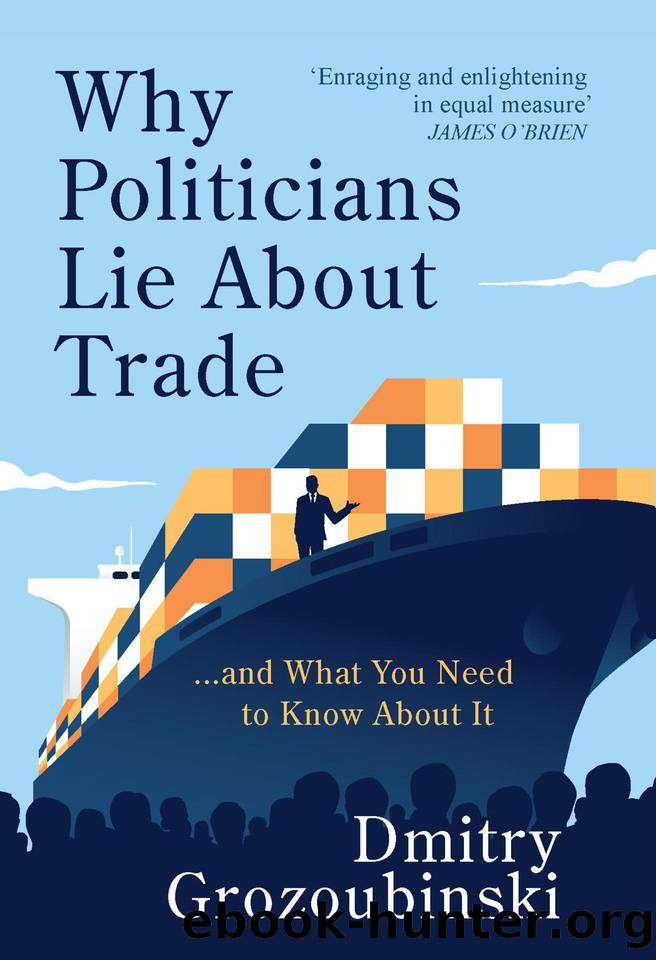Why Politicians Lie About Trade... and What You Need to Know About It by Grozoubinski Dmitry

Author:Grozoubinski, Dmitry
Language: eng
Format: epub
Publisher: Canbury
Published: 2024-05-23T00:00:00+00:00
Removing Tariffs and Tariff Bureaucracy from the Equation
If my country and your country signed a free trade agreement eliminating all tariffs on every product type without exception, we would still need customs declarations and full tariff classification on goods moving across our mutual borders. Why? Because I canât trust that goods entering your market and then making their way into mine paid the tariffs they would have paid if they had entered my market directly â and I also canât trust that something crossing into my territory from yours actually originated there.
Letâs conjure up an example. Your country has a long cultural history of growing papayas, a form of agriculture critical to the livelihoods of many of your citizens and their communities. You know there are cheaper sources of papaya abroad, but you consider the papaya sector so vital that you have imposed a tariff at the border to keep your own homegrown papaya sector competitive. Your next-door neighbour produces only a few luxury papayas, so doesnât directly compete with your more egalitarian and commercially accessible 'peopleâs papayas'. Thatâs why, when you negotiated a free trade agreement with it, you agreed to eliminate your papaya tariff. Your neighbourâs industry is no threat to the bulk of your producers and your high-end restaurants benefit from access to its more refined fruit.
Yet now you face a problem. Because your neighbour is much less interested in growing papayas than you, it slaps a much lower tariff on them. It is also far more relaxed about trading away that smaller tariff when negotiating free trade agreements with others, even if they are large papaya producers. This means that if you want to stop a flood of cheap foreign papayas entering your market via your neighbour, you need border checks to ensure that any papayas claiming to be from your neighbour were actually grown there. While eliminating the tariff, your free trade agreement hasnât eliminated papaya customs bureaucracy. It may even have made it worse.
Granted, governments could simply choose to ignore the risk of someone bypassing their tariffs through this kind of backdoor arbitrage, but both states would have to be comfortable with it or you would end up with a situation where there is effectively only a border one way. If you donât care if third countries are exploiting your free trade agreement to bring in stuff tariff-free, but the other country does, it will demand tariff declarations and Rules of Origin (even if you donât). That means your traders are going to find themselves at a massive disadvantage because theyâll be the only ones facing border tariff paperwork. Effectively, both sides will have eliminated tariffs but just one will still face bureaucracy.
Moreover, the industries that your third-country tariffs were meant to protect are unlikely to remain silent in the face of suddenly finding themselves unprotected. Effectively giving third countries full liberalisation into your market without getting anything in return is a hard argument to sell to your furious large producers â who are probably politically potent and well-represented.
Download
This site does not store any files on its server. We only index and link to content provided by other sites. Please contact the content providers to delete copyright contents if any and email us, we'll remove relevant links or contents immediately.
The Pirates of Somalia by Jay Bahadur(1630)
Political Theology by Carl Schmitt(1582)
The Holocaust: A New History by Laurence Rees(1524)
The Social Animal by David Brooks(1454)
A Practical Guide to International Arbitration in London by Hilary Heilbron(1439)
Restitution by Restitution(1425)
Pirates of Somalia by Jay Bahadur(1383)
Coercing Virtue by Robert H. Bork(1358)
The Nuremberg Interviews by Leon Goldensohn(1306)
Basic International Corporate Taxation by Sebastiano Garufi(1217)
A History Of Thailand by Baker Chris(1193)
International Trade and Business: Law, Policy and Ethics by Gabriël Moens & Peter Gillies(1152)
The Global Commons by Susan J. Buck(1138)
Blood Profits by Vanessa Neumann(1119)
Asian Waters by Humphrey Hawksley(1115)
The Sovereignty of Human Rights by Macklem Patrick(1114)
Spring Fever: The Illusion of Islamic Democracy by McCarthy Andrew C(1105)
The Nuremberg Trials: The Nazis and their Crimes Against Humanity by Roland Paul(1054)
Crimes Against Humanity: Historical Evolution and Contemporary Application by M. Cherif Bassiouni(1029)
